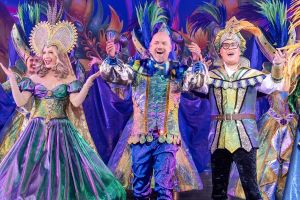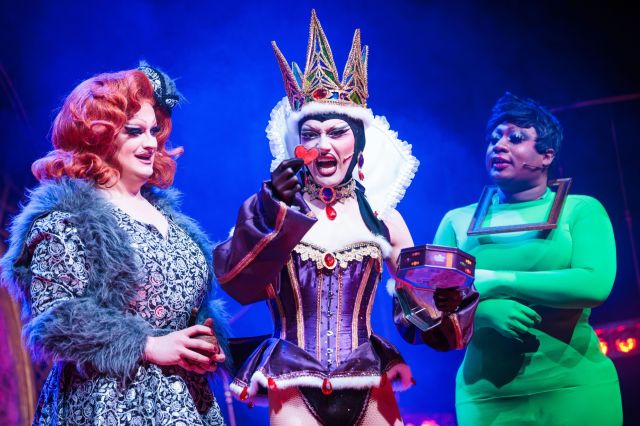Michael Coveney: O2 Discomfort, delight and Happy Martin Crimp-mas
There seem to be quite a few critics hobbling around in physical discomfort at the moment, not all of it self-induced. Long gone are the days when a reprobate like Ken Campbell could cry, unforgivably, “Which cripple do you read on Sundays? Hobson (Harold, Sunday Times, polio since childhood), Cushman (Robert, Observer, rheumatoid arthritis) or Marcus (Frank, Sunday Telegraph, Parkinson’s disease)?”
The healthy dislike of unhealthy critics by the theatre profession came back into focus again the other day when David Hare declared that nothing could match the general rejoicing when a critic finally retired. But he drew the line at commenting on physical disability.
My colleague Mark Shenton has been graphically describing on his blog his own physical trials (he’s only fifty) with hip and spinal problems. He’s currently going around with a large plastic bag containing a booster seating pad which ensures that his legs are suspended nineteen inches above the ground in any situation.
His condition won’t have been helped one bit by the seating at the O2 Centre on Wednesday night when Paul O’Grady as Lily Savage opened, somewhat diffidently, in a 35-performance run of Aladdin. Not even a glimpse of “a lad in pink tights” to ease Mark’s pain and discomfort.
Nor ours, as it happens. The seats in the improvised inflatable arena – seating 1,900 people – were excruciatingly uncomfortable, seemingly designed for an audience of hump-backed midgets with ultra-slim buttocks. And not one member of the Critics Circle fits that category, despite its curious variety of physical types and tendencies.
But that wasn’t all. The place was freezing cold and seemed to get colder the more the deafening blasts of the so-called heating system drowned out the quiet moments in the performance. It was like sitting in a Richmond garden on a winter afternoon with Heathrow traffic overhead.
Then there was the bar: one counter for 1,900 people seemed like an optimistic arrangement. Instead of providing a much-needed, simple-to-set-up critics’ table with plonk and juices, the management issued us with flimsy vouchers. The situation was impossible, until the O2’s amenable general manager, Rebecca Kane, intervened and suddenly spirited a couple of drinks out of thin air, which is considerably more than Issy van Randwyck as the Slave of the Ring managed all night.
Going to the O2 is a grim exercise – I’ve braved it three times now: for Julie Andrews, Jesus Christ Superstar and Aladdin – although the actual travelling on the Jubilee Line is dead easy for me (forty minutes door to door).
It’s clear that the huge numbers of people who do go, absolutely love it. They love the noise, the crush, the choice of revolting bars and restaurants (I’ve only tried the Cafe Rouge, where the service is fast and very friendly at least). And that is partly because they have gone to the O2 for a very specific reason: to see a group or an artiste, or even a show, they love and admire. It’s not a “night at the theatre” sort of pot-luck outing. It’s a mission, and its difficulties are all part of the non-negotiable experience.
On the night of Lily Savage’s opening, the main arena was completely sold out for a rock and soul duo called the Black Keys. Those ten thousand people would not have exchanged being there for all the tea in China, let alone a complimentary pot of tea in Widow Twankey’s launderette.
So, to that extent, as long as it gets its programming right, the O2 Centre doesn’t have to worry over-much about how the customers are looked after once they are corraled in. The queues, the security men and the general difficult and demeaning stadium ambience are all part of the deal.
Still, the Aladdin opening was a bit of a shock to the system, though I have to admit they got the toilets right: I’ve never seen so many pissoirs in any theatrical Gents, and there were reliable reports of free hand cream in the Ladies.
But, oh, what a relief to be back in the bosom of the friendly National Theatre yesterday afternoon, even if Katie Mitchell’s Hansel and Gretel (written by Lucy Kirkwood) is severely disappointing. Mind you, the Cottesloe seats are distinctly penitential, though I suppose that might be about to change with the re-design and refurbishment as the re-titled Lloyd Dorfman (he of Travelex £10 and £12 ticket fame).
And last night the Royal Court’s brown leather armchairs, complete with airline-style pouches for programmes, papers and vomit envelopes, proved once again that they take some beating. And so does Martin Crimp’s In the Republic of Happiness, which I’ve immediately installed as my favourite play of the year. just pipping Alan Bennett’s People to the post in that category.
Crimp’s plays are usually dark, sombre, difficult to follow and directed by Katie Mitchell. But Dominic Cooke’s production is hilarious, witty, airy, impish and played in constant white light. Some will stub their toes on what it actually all means, but I’m not a great one for meaning or solutions or answers in theatres (unlike Michael Billington, perhaps). Nor do I necessarily want to see something I agree with. I prefer allusions, illusions and questions.
As Libby Purves has already suggested in her Times review, it’s a Happy Martin Crimpmas to one and all.












